As the late film maker Christopher Nupen wrote: “The reopening of the Vienna State Opera…took place in November 1955. It was the biggest musical event in Europe since the start of the war in 1939.” And Lehmann was there.
Below, you can read what Lehmann’s biographer Beaumont Glass wrote about her appearance at that grand occasion.
Here’s a link to Nupen’s story of meeting Lehmann for the first time by accident at the reopening.
You can listen to the talk Lehmann gave upon returning from this great adventure to an invited audience at the Music Academy of the West.
Here’s a newsreel from 1955 telling of the Reopening and Lehmann entering the Vienna Opera house.






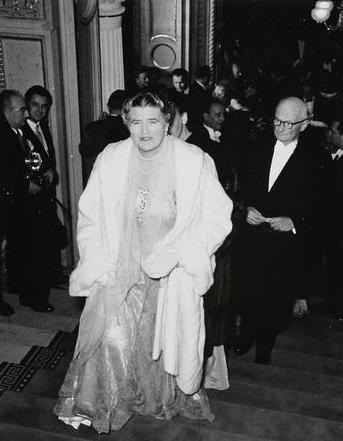
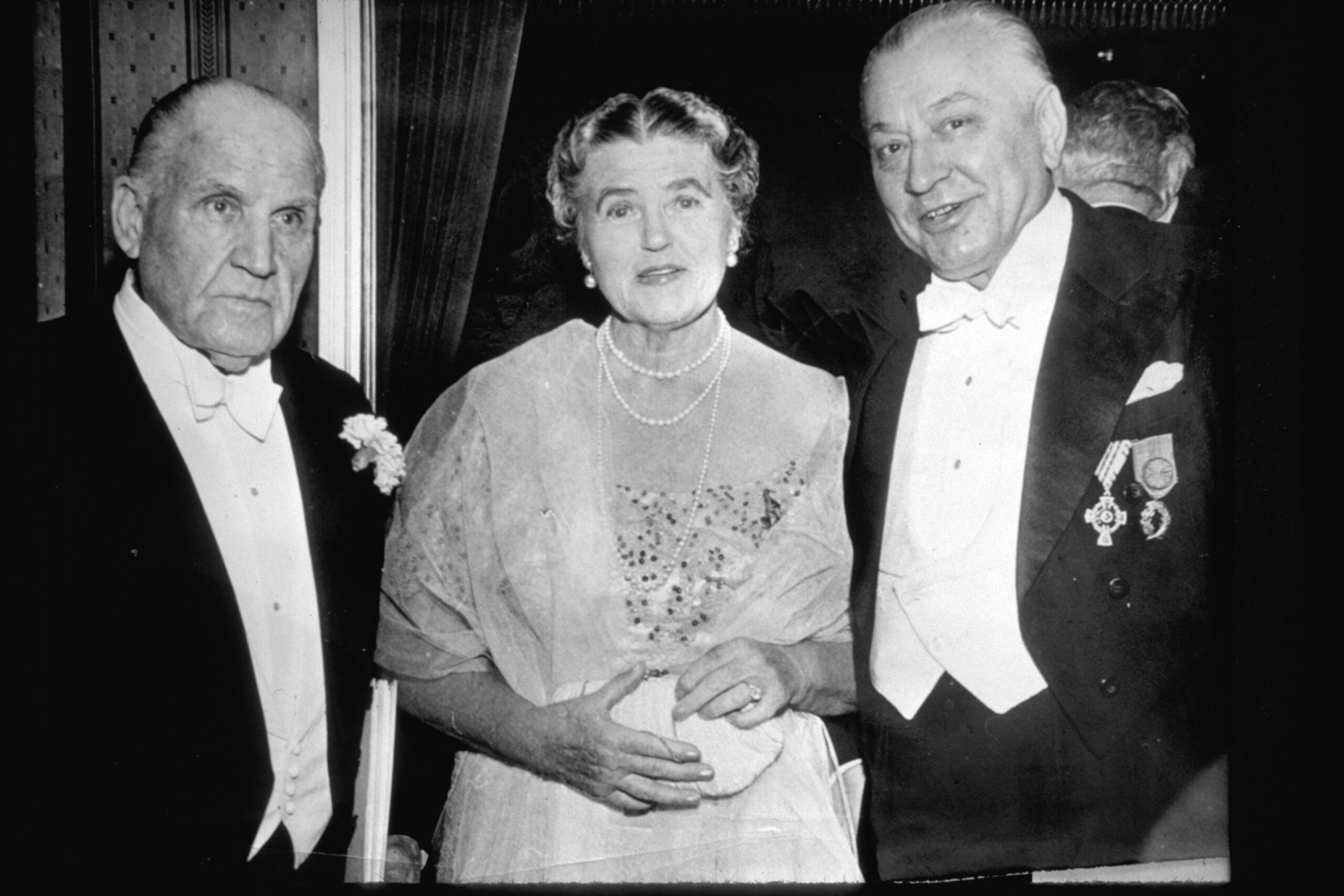
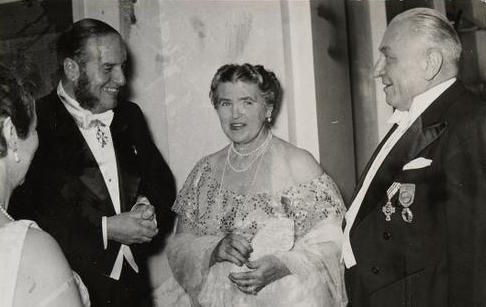
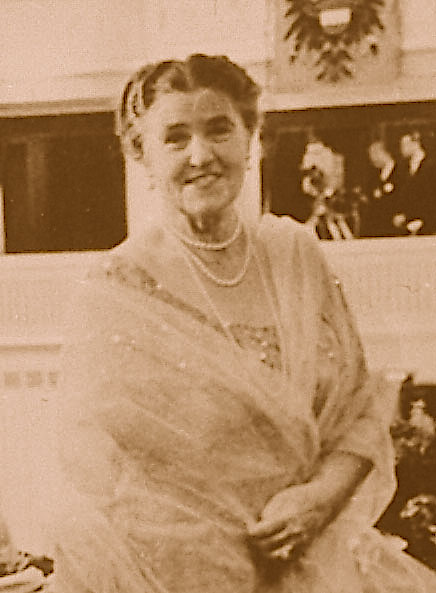
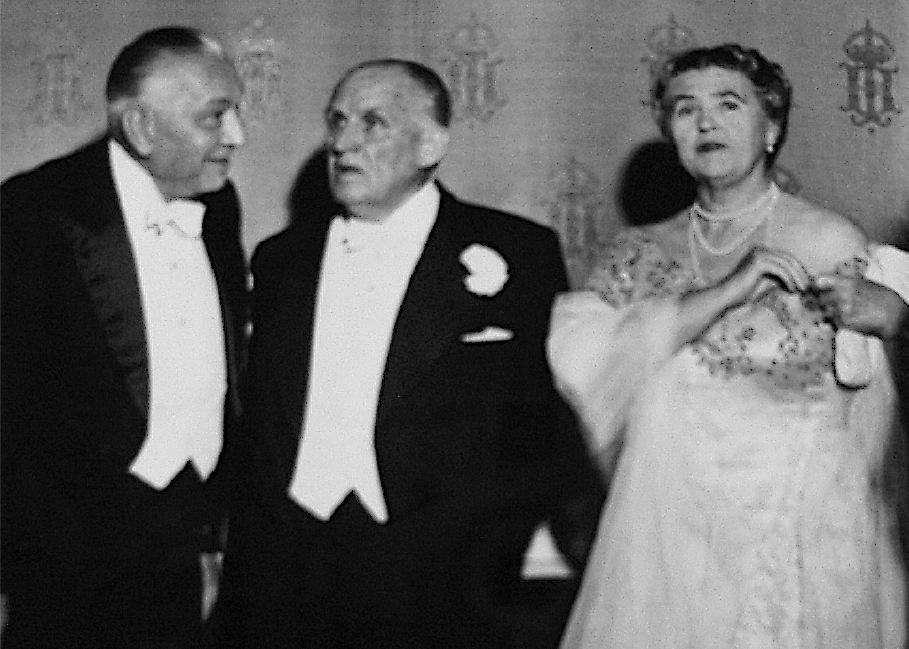
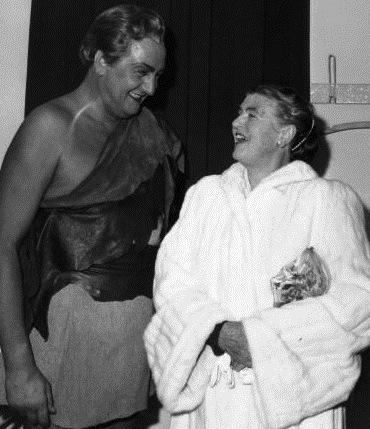
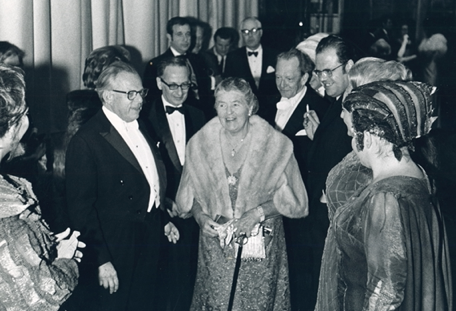
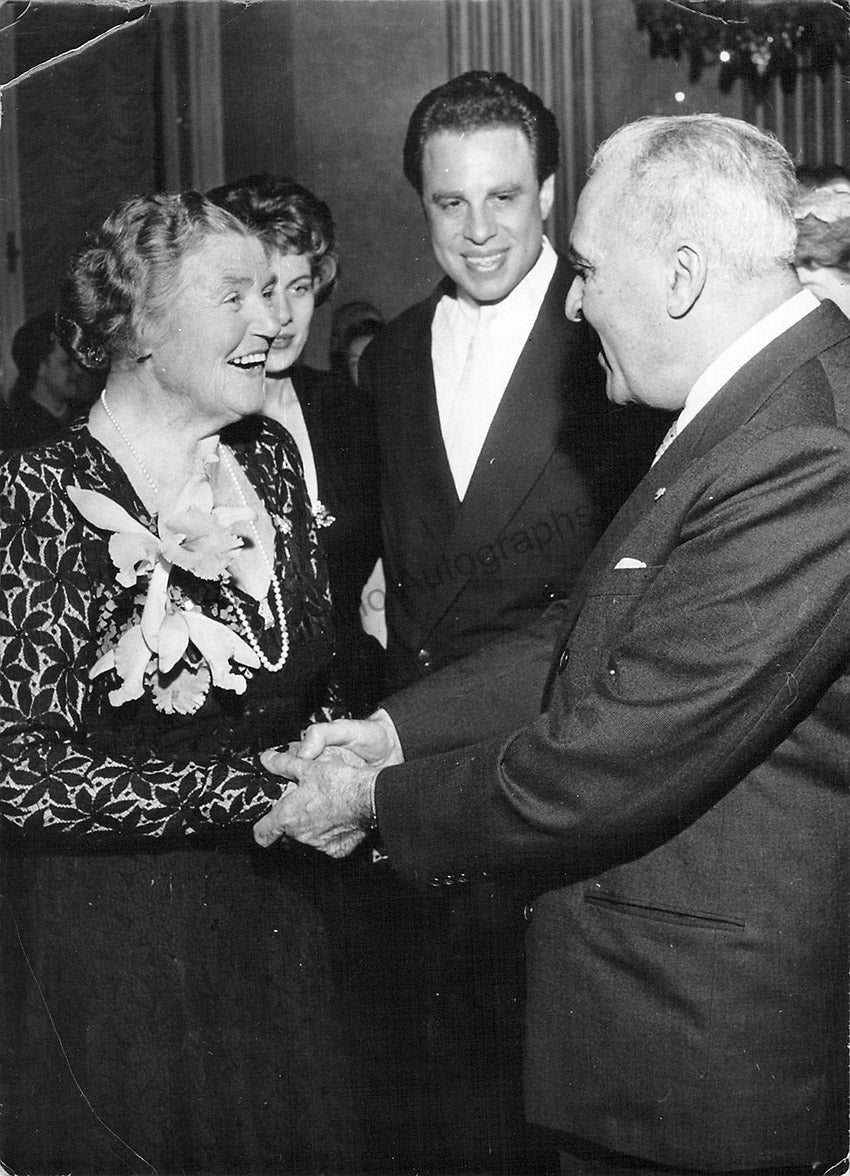
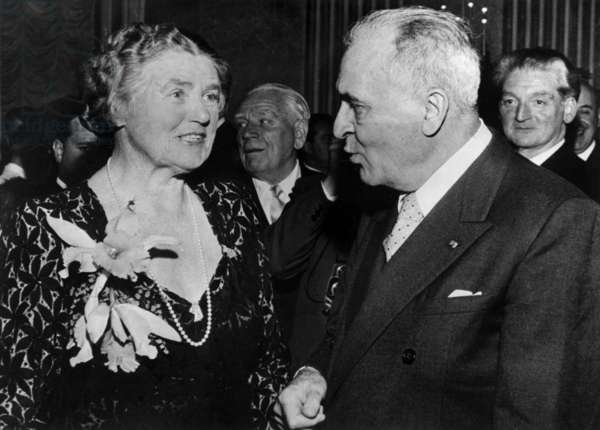
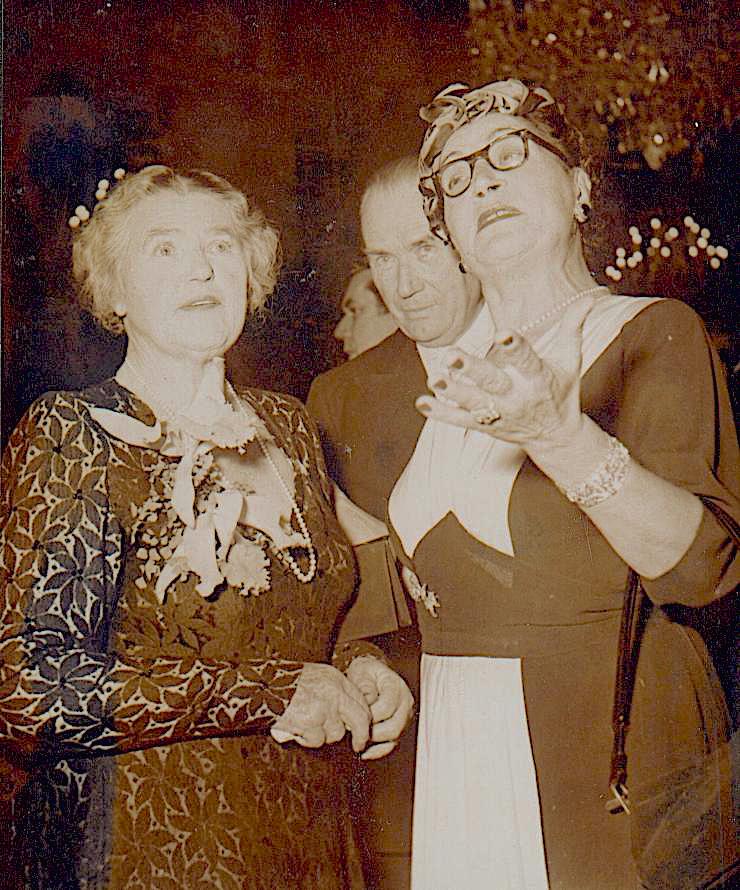
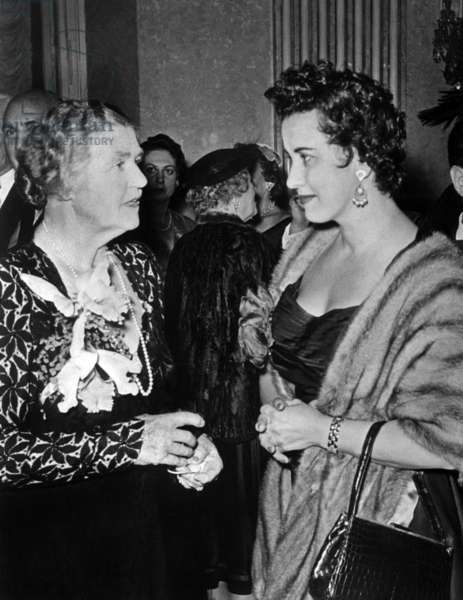
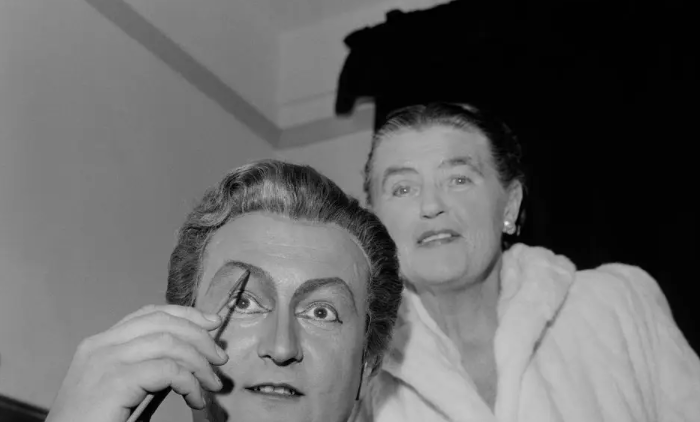
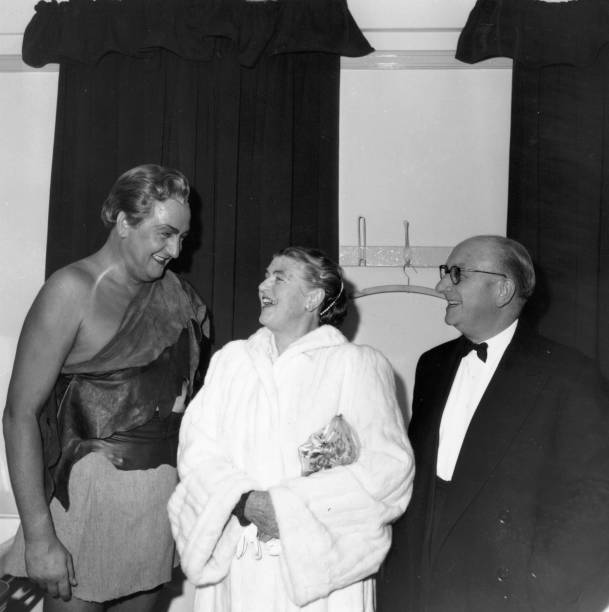
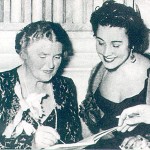
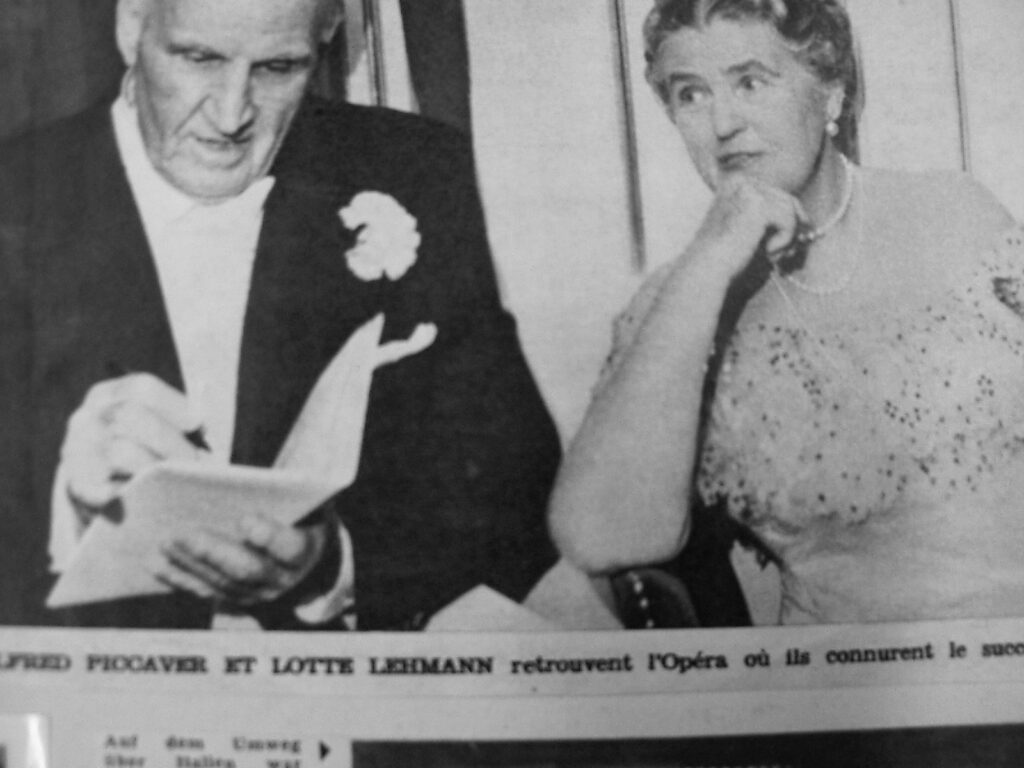
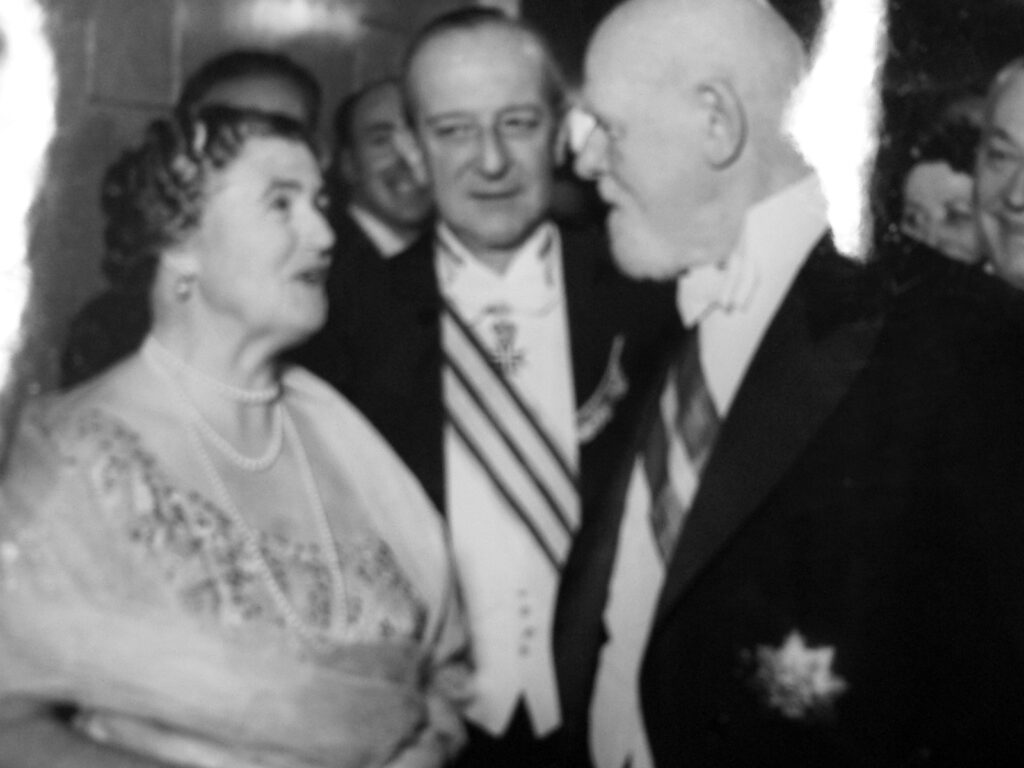
Beaumont Glass tells the story of Lehmann returning for the reopening of the Vienna Opera:
Exactly Like a Queen
The reopening of the Vienna Opera on November 5, 1955, was one of the happiest events in Lotte’s life.
She was invited to the celebrations as an honored guest.
In one of the last months of World War II, on the night of March 12, 1945, “Black Monday” to the Viennese, four or five high-explosive bombs and a large number of incendiary bombs had struck the roof of the opera house, destroying the stage and the fire-curtain. A frantic effort was made to save the beautiful old auditorium. But there was no pressure in the water outlets. The building burned for twenty-four hours. The majestic façade facing the Ringstrasse—the broad chain of avenues that encircles the inner city—remained standing; the main vestibule, grand staircase, foyer, and richly frescoed loggia were preserved. The rest of the interior was gutted down to the ground.
That was a night of heartbreak for the people of Vienna. Surely nowhere else in the world was a building so important to so many—even to those who had never been inside it and never hoped to be. Since the collapse of the Austro-Hungarian empire, its relative value in glory had only increased. It was the symbol of Vienna’s greatest contribution to the world: her music. Proportionately more tax money was spent on the opera in Austria than anywhere else on earth.
The rebuilding of the Vienna State Opera was a remarkable achievement. The old appearance was preserved on the outside, and is as magnificent as ever. The auditorium is all new, but traditional in its atmosphere. The reopening was a joyful, sentimental occasion for every Austrian, and Lotte was thrilled to be a part of it.
It was her first return to Europe since 1937.
Frances, as chatelaine of Orplid, stayed behind to dog-sit. Betty Mont, a friend who had been a great help and support to Fritz at the time of his stroke, was Lotte’s traveling companion. The trip began in late September with two weeks of master classes at Northwestern University in Evanston, Illinois. There Lotte heard for the first time a young singer who soon became her protégée: Grace Bumbry, then nineteen years old and singing mezzo-soprano. “She is outstanding,” Lotte wrote to Frances; “she has to come to Santa Barbara next summer.”
The next stop was New York. Lotte had lunch with Toscanini on October 16. The next day she wrote to Frances:
Maestro has aged very much. He is really very frail, almost blind. He was pathetically happy to see me and was very flattering: “More beautiful than ever and very slender….” So he saw that!!! I am so glad that I saw him. He moved me very much.
Then came Paris, Rome, Florence, Venice. Lotte had looked forward to seeing again those places of beautiful memory. The reality was melancholy to her. The excitement was gone, perhaps irretrievably. Those places had not lost their beauty; the change was in Lotte. It saddened her to think that she might be too old to recapture the exhilaration of her gypsy days. She found herself standing before great works of art and architecture strangely numb, unmoved. Only one painting stirred her deeply: “Cristo morto,” by Bronzino, in the Uffizi Gallery, Florence. It had moved her many years before. When she looked at it this time she burst into tears. But nothing else seemed to speak to her.
She began to wonder if Vienna would be another disappointment.
Lotte had decided to make the trip only with great misgivings. “Never go back,” she had often been told. She knew that the older people would remember her. But for the younger generation she was only a name.
It would have been a painful experience to walk through the streets of Vienna without being recognized. I prepared myself. “Don’t be a silly prima donna,” I said to myself. “You are entirely unimportant in Vienna. Don’t forget that.”
She steeled herself and drove across the border into Austria.
Then the fairy tale began. She found out that she was the princess.
On her return, she told the story in a talk presented by the Opera Guild of Southern California on January 19, 1956, at the Beverly Hills Hotel: [similar to the audio version of Lehmann telling the story at the top of this page.]
We spent the first night in Villach, a small town near the border. And there I had my first taste of things to come, things which overwhelmed me and made me more happy than I can say. I was scarcely in my room when there was a knock at the door. In came the innkeeper, literally trembling with excitement, clutching a bunch of flowers which he may have taken from one of the dining room tables. He almost couldn’t talk for excitement. The fact that I was there, spending the night in his hotel, seemed to be something out of this world for him. Being recognized immediately, being greeted in such an enthusiastic way, moved me so deeply that I broke into tears. It certainly made a comic scene, both of us stammering and tears running down our faces…. I said to my friend: “If this already makes me weep, what will happen in Vienna?” The next morning our car was surrounded by people who had heard I was there and we drove away in a flurry of waving hands and shouts of joy….
We stayed two days at Semmering, a beautiful mountain resort…. An old colleague came for a visit; and before entering Vienna I was informed about all the gossip of eighteen years. How truly Vienna that was! I was told exactly what this person said to that person—and the only thing that was different was that all my old colleagues are too old for romances….
In Semmering, her old friend, Alfred Muzzarelli, the one who had found his “head tones” during the darkest days of the war, was the first of the old colleagues to pay a visit. She wrote about that to Frances:
Muzzarelli says that Vienna is going to tear me to pieces, everybody waits for me, talks of me…. We felt it already here: even the woman at the newsstand said: “What? Lotte Lehmann?” At dinner yesterday the musicians played melodies from every opera I had sung in…. It is really very touching. They certainly have not forgotten me!
Lotte’s “official” description continues:
Then, after Semmering—came Vienna.
We stayed at the Ambassador Hotel, near the Opera House. I had the so-called royal suite, the walls covered with red silk, everywhere wonderful chandeliers. I really felt like a queen….
My maids from former years had made inquiries when I would arrive. And there they were—all of them. They had decorated the door of the apartment with garlands and a big sign: “Welcome home to Vienna.” I don’t know what the hotel manager thought about the nails in the doorframe. My rooms were so filled with flowers that it was difficult to put anything down….
Eighteen years ago I had some special fans who followed me everywhere. They were young at the time and they lived, apparently, only for the pleasure of waiting for me on street corners, shouting “Hoch Lehmann!” whenever I appeared. [Hoch is the German equivalent of “long live…” or “hurray for….”] They are now middle-aged, married, have children. But there they were—with shining eyes, hands full of flowers….
You see, there is a very strong bond between the audience and the singer here, stronger than in any other country, I believe. Music is so very much a part of their lives. All the people feel music in their blood, as necessary for them as the air they breathe. And the artist who brings this music to them becomes much more than an idol—more like a part of their lives. Therefore, their adoration is a very personal one. For instance, and you will understand how deeply this moves me, in all those years some of my loyal young friends went out to the cemetery on anniversaries to bring flowers to the grave of my parents. They did that through all those eighteen years…. When I visited the grave I found candles burning and flowers covering the stone. I cannot tell you how humble and grateful I felt.
Also the ties which bind me to my old colleagues are very strong ones. They gave me a big reception. The old ones wanted to see me again, the young ones to meet me. And they wanted to thank me for some help which I had given them after the war in the time of great need. I was very moved about their appreciation of something that anyone would have done.
She could express her feelings more freely to Frances, without the fear that boasting might be construed as conceit, in the following excerpts from several letters combined:
I wish—oh, how I wish it!—you could have been there yesterday at the reception! It was quite incredible: many of the old colleagues greeted me with tears, some could scarcely speak, they were so moved. Reporters from all over the world were there who incessantly photographed me…. Just now comes a package with two marvelous hats as a present from my old hat salon. I am quite overwhelmed. How happy I am to have come here!!!
Then, still to Frances, after the gala reopening and other exciting events:
Ach, it was wonderful. It would have been a crime not to come here. I am borne as if on wings by an incredible love and adoration. That is really only possible in Vienna, this kind of loyalty! I love America, as you know, but this kind of faithful adoration is only possible here…. The people love me still as they did many years ago. Vienna appears to me in a glow of affection and wonder…. Yesterday after the tremendous reception at the Musikvereinssaal we were — — — in a bar!!! Just for a half an hour. Sensation! Applause!!! Everywhere people who recognize me instantly…. I almost drown in love and admiration! Oh, it is quite unbelievable how people on the street greet me literally in tears! This trip has made me very happy….
Returning to her talk:
On the fifth of November in the morning was the official act of the reopening of the Opera. Only invited guests were there and the house was filled with a very distinguished crowd. I sat in the box of honor with some other honorary members….
Oh, it was an unforgettable moment when the iron curtain rose; even now, in memory, it chokes me! This wonderful old house which has served only beauty, which has given joy and uplift to thousands of music-loving people, had been mute for so long. Now it will live again. Now the old times will come back again, I am sure of that. I am not one of those people who sigh for the past. Nobody is irreplaceable. Wherever some beauty dies, some new beauty is being born….
When I came downstairs at the hotel [the evening of the opening performance] it felt like old times; I knew I looked well—and you know how that can give one all the necessary poise and dignity. The whole square before the hotel was black with people who wanted to see me and there I went, exactly like a queen, through the cheering crowd!
Arriving at the Opera…we walked through a battery of cameras up to the box; and the delight with which my name was said, again and again, awakened in me a delight which certainly matched that of my old admirers.
The box was decorated with roses; and we were in a crossfire of popping flashbulbs. There we stood, side by side, Alfred Piccaver and I, who once had been, and I say this with all humility, favorites of the audience…. He is now old and I am old—but I certainly did not feel it at all at that moment….
The Fidelio performance began. Perhaps you would like to know details about the performance. I am sorry. I was much too excited really to take it in. You see, Fidelio is so very near to my heart. It is difficult for me to go into details…. The important thing was that the Vienna Opera House was alive again. Beauty had awakened out of ruins. The heart of Austria was beating again…. Oh, it is so deeply moving—people began to give money for the rebuilding of the Opera House even before they started to rebuild their own living quarters. And that is a fact! Now all the people were there, standing outside the house like a long wall. Looking at the lighted windows, listening to the radio which brought to them the splendor of Beethoven’s music, the lovely voices of the singers who will continue where we had to stop. It was not only a happy day in their lives, it was a holy day, a day of deepest thanksgiving….
I want to tell you something quite interesting: willpower is really all we need when we want to succeed. You see, I have rather bad arthritis in my knee and walking down stairs is very difficult for me. After the performance I had a moment of terrible panic. I had to walk down the stairs which were flanked on both sides with photographers and reporters. I said to myself: “This I cannot do, I cannot show them that I am so handicapped. I just have to walk as if nothing is the matter with me.” AND I DID! I just walked down as if going on clouds. I really don’t know how I did it. When I reached the ground floor my knee hurt me like the devil. But never mind that….
There were receptions… luncheons… reunions….
At the opera I heard two more performances: Don Giovanni and Die Frau ohne Schatten, which I really heard for the first time from “out front,” having always sung the Dyer’s Wife myself. The one quite exceptional voice I heard was that of Leonie Rysanek, who sang the Empress….
I must tell you about Geoffredo, my Italian chauffeur. When we came to Austria it dawned on him that I was a well-known singer. That gave him delusions of grandeur. He believed that the mere mention of my name was a kind of “Open Sesame.” For instance, he drove down a one-way street in the wrong direction. When a policeman stopped us, he said, with a theatrical gesture: “This is the car of Madame Lehmann.” The cop blushed in embarrassment: “Even Madame Lehmann cannot drive through here.”
When we went to a performance of Madame Pompadour at the Volksoper, Geoffredo told me afterwards that he had seen it too—for nothing. “I told them `Chauffeur of Madame Lehmann’ and they said `PLEASE!’ [= be my guest!]”
When, during the official reopening ceremony my name was mentioned over the loudspeakers and the people in the street broke into applause, he got up, asked with a wide gesture for quiet, and said: “Me—the chauffeur of Madame Lehmann” and got a tremendous ovation….
Ever since receiving the invitation to attend the reopening ceremonies, Lotte had worried about what might happen if she and her nemesis were sharing the same box at the opera. Fortunately for Lotte, Jeritza canceled at the last moment when she was informed that there would be no place beside her for her new husband. (Alma Mahler-Werfel, incidentally, had specified that she wanted a box of her own, with neither Lehmann nor Jeritza anywhere near her.) Lotte’s companions among the honored guests were Helene Wildbrunn, Anny and Hilde Konetzni, Maria Nemeth, Emil Schipper, Hans Duhan, and—basking in glory at her side—Alfred Piccaver.
According to Frances, the trip to Vienna gave an enormous boost to Lotte’s morale. She had been so afraid of finding herself forgotten. It also gave her again a taste of what it means to be a beloved prima donna. She had her devoted audience at Town Hall in New York, of course; she had inspired enthusiasm in Chicago, Boston, San Francisco, and almost everywhere else in America. But none of that had come close to the response of Vienna.
